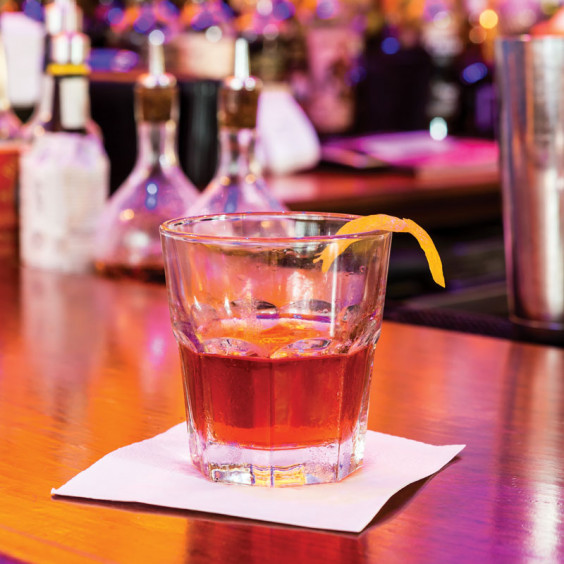The Sazerac is cocktail straight from New Orleans using Cognac but whisky is also used. Just after the turn of the 19th century similar cocktails were popular in New Orleans.
:max_bytes(150000):strip_icc()/sazerac-cocktail-recipe-760604-step-07-1fa380080d6246fcb6706e46c6202ac7.jpg) Classic Sazerac Cocktail Recipe With Rye Whiskey
Classic Sazerac Cocktail Recipe With Rye Whiskey
Del Maguey Single Village Mezcal a cousin to the Tequila family of spirits Campo de Encanto Pisco a Peruvian brandy Banks Rum Siete Leguas Tequila Glenfarclas Single Malt Scotch Dimmi Liquore di Milano an Italian liqueur and the Casa San Matias Tequilas.

What's in a sazerac. Brandy or cognac which are distilled from grapes yield a Sazerac that is fruity and floral different than todays rye-based versions which feature the grain spirits trademark spice notes. The Sazerac is the holy grail of historical cocktails and is argued to be where the name cocktail originates a mixture of spirits bitters and sugar to be exact although cocktail historian David Wondrich contests this theory. A well-made rye Sazerac is indeed a tasty cocktail full of kick and depth though perhaps a hair too much muscle.
In fact the cocktail is such a sacred part of New Orleans culture that in 2008 it was. Its skeleton is that of a classic whiskey cocktailbooze bitters sugar and waterbut its bulk is far more substantial. Peychaud who was quite fond of this drink then opened the Sazerac Coffee House euphemism for saloon on Exchange Alley.
Its simple mix includes rye whiskey sugar bitters and absinthe. It was at the Sazerac Coffee House on Royal Street where local patrons were served toddies made with Rye Whiskey and Peychauds Bitters. He made the drink by mixing his own blend of bitters with the French cognac sugar and water.
New Orleans was the birthplace of the sazerac. Sazerac Rye Whiskey symbolizes the tradition and history of New Orleans. The Sazerac is a beast of many.
It is a complex drink that requires attention to detail proper technique and the right proportions to fully reveal its brilliance. A Sazerac is a cognac or whiskey cocktail with roots in New Orleans Louisiana. The cocktail was invented by Aaron Bird as a way to promote a specific brand of imported French Cognac Sazerac.
While the Sazeracs combination of flavors is certainly not lacking in complexity and can make one giddy at the pure mystical beauty of alcohol alchemy its recipe isnt so long as to be intimidating. The Sazerac is a whiskey cocktail from New Orleans and one of the oldest cocktails with American origins. Originally a Cognac vehicle todays Sazeracs are often made with rye riffing on the Old Fashioned s whiskey-sugar-bitters rubric.
Straight from New Orleans the Sazerac is a classic cocktail that remains popular. Its simple mix includes rye whiskey sugar bitters and absinthe. The Sazerac is a low ball cocktail made with Cognac or rye whiskey absinthe and Peychauds bitters.
The exact history of the drink is murky but it was invented in New Orleans. Rye Whiskey dates back to the 1800s around the time when saloons veiled as Coffee Houses began lining the streets of New Orleans. Sazerac is home to over 450 brands from distilleries across the globe.
Do use a single dash of Angostura bitters in your Sazeracs. The Sazerac is a stiff drink. The Sazerac is one of the oldest cocktails in the modern repertoire but dont let its unassuming presentation fool you.
He also enjoyed a fine French Cognac that was available at the time Sazerac so he created the Sazerac cocktail with the addition of a sugar cube and Herbsaint better known as Absinthe. Some of our liquor brands have centuries of heritage while others are new and exciting. In 2014 Sazerac announced the creation the Bond Royal Company located in Chicago Illinois to take over the specialty and craft segment of its brands from the Gemini Spirits and Wine portfolio including.
Rye whiskey Herbsaint or absinthe or pastispick your fave but you get the picture Peychauds bitters and some would argue passionately Angostura too a sugar cube. Originally the recipe called for cognac absinthe Peychauds Bitters and sugar. Rye whiskey or bourbon is often substituted for cognac while anise-flavored liqueurs like Herbsaint can be used instead of absinthe.
In the 1830s an apothecary named Antoine Amedee Peychaud concocted the version that would become known as the Sazerac.











